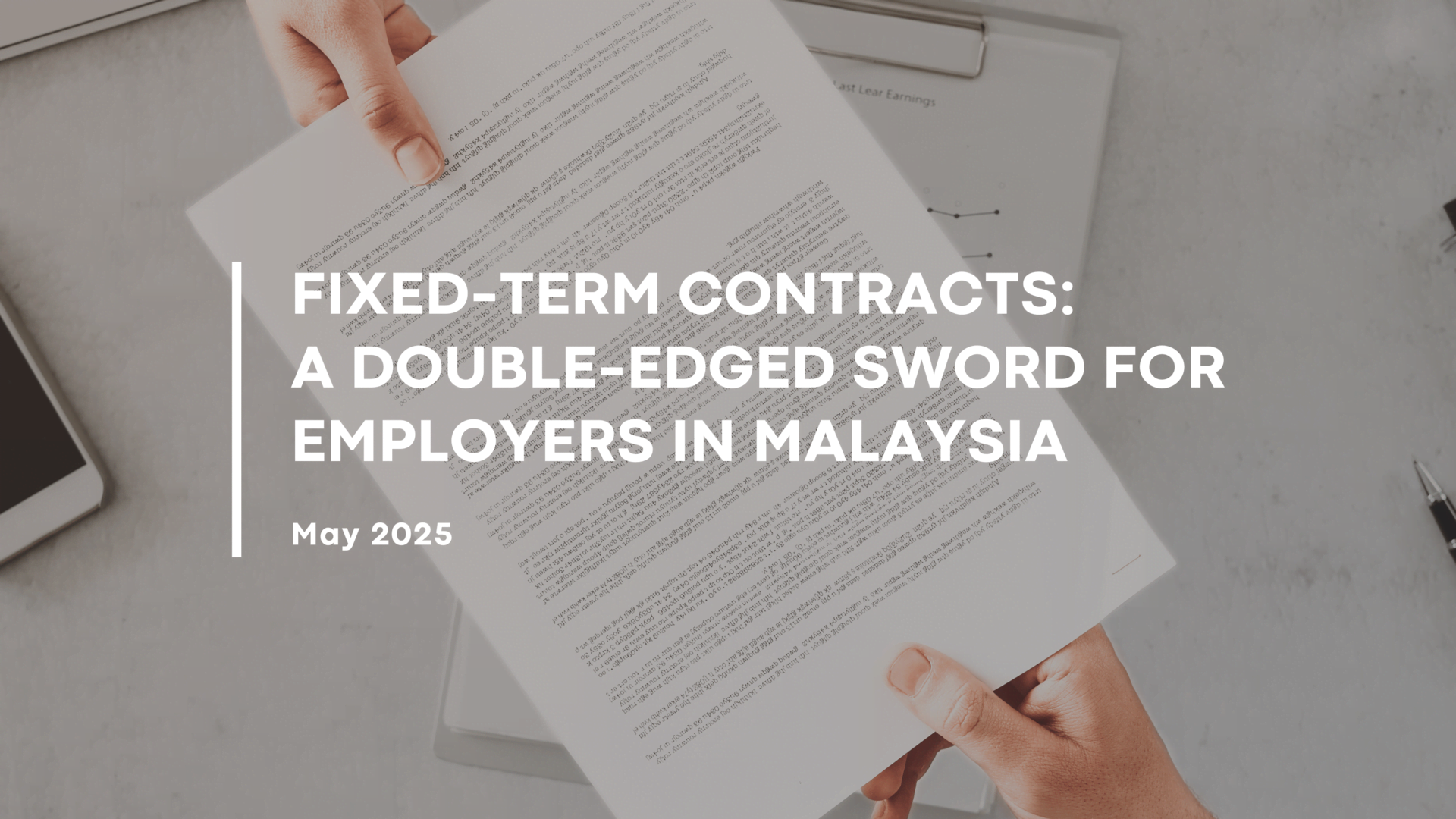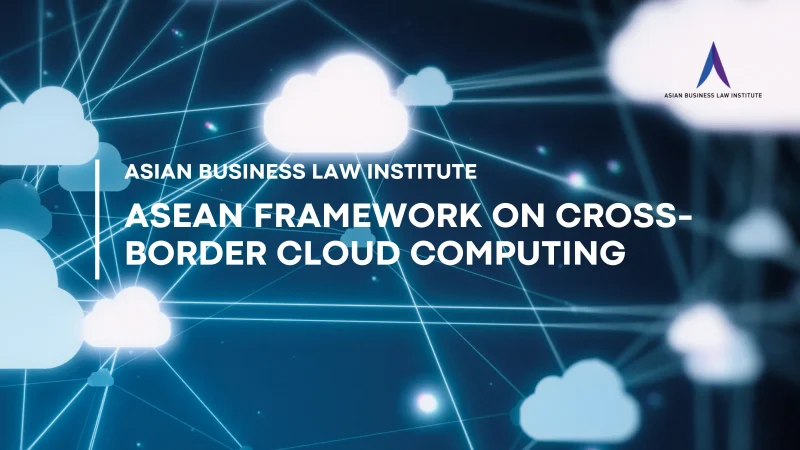In Malaysia, fixed-term contracts are often perceived as a flexible mechanism for managing staffing needs. However, the legal framework surrounding such agreements is far from straightforward. This article delves into the key considerations for employers, highlighting how the misuse of fixed-term contracts may inadvertently create a permanent employment relationship, with potential exposure to unfair dismissal claims under Malaysian employment law.
A. Introduction
Many employers in Malaysia assume that hiring employees on fixed-term contracts gives them greater flexibility, particularly when ending the employment relationship. The common thinking is that if an employee proves difficult or underperforms, the company can simply choose not to renew the contract when it ends. However, this approach can backfire as it fails to appreciate the legal position under Malaysian employment law.
Where the fixed-term arrangement is, in substance, a mechanism to disguise what is a permanent employment relationship, or where there exists a legitimate expectation of renewal, the non-renewal of such a contract may be construed as a dismissal. In such cases, the employer may still be exposed to a claim for unfair dismissal under the Industrial Relations Act 1967 (“IRA”).
B. The Industrial Court’s Approach
The principle pertaining to fixed-term employment contracts was laid down in the case of M Vasagam Muthusamy v. Kesatuan Pekerja-Pekerja Resorts World, Pahang & Anor [2003] 5 CLJ 448.
In cases involving fixed-term contracts, the Industrial Court will usually determine:
1. Whether or not the employment contract is a genuine fixed-term contract;
2. If the employment contract is not a genuine fixed-term contract, the Court would have to determine whether there was a dismissal or not and, if so, whether it was with just cause or excuse; and
3. If, however, the employment contract is a genuine fixed-term contract, then there would be no issue of dismissal to begin with.
C. Determining the Authenticity of Fixed-Term Contracts: Key Legal Considerations
In determining whether an employment contract is a genuine fixed-term contract of employment or a permanent contract of employment disguised as a fixed-term contract of employment, the Industrial Court is guided by the principles as set out in the Federal Court case of Ahmad Zahri Mirza Abdul Hamid v. AIMS Cyberjaya Sdn. Bhd. [2020] 6 CLJ 557.
In this landmark decision, the Federal Court of Malaysia considered two key points:
1. Whether a need for a work permit is a material consideration in determining whether an employment contract is a genuine fixed-term contract; and
2. Whether a contract of employment which is renewed successively without application by the employee and without any intermittent breaks in between, is in reality a permanent employment.
Facts
In this case, the appellant, a Singaporean national, was initially engaged by AIMS Data Centre 2 Sdn Bhd (“ADC”) under a consultancy contract from the period of 2009 to 2010. The contract was renewed annually for four consecutive years. By the fourth renewal, the employment arrangement transitioned to AIMS Cyberjaya Sdn Bhd (the “Company”), following the phasing out of ADC.
In 2013, the Company proposed a new contract with altered terms, which the appellant declined. A subsequent three-month contract was offered which the appellant also refused. The Company granted the appellant an early release, and effectively ending his service. The appellant subsequently filed a representation under Section 20 of the IRA, alleging unfair dismissal.
Relevance of Work Permit Requirements in Assessing the Genuineness of Fixed-Term Employment Contracts
The Federal Court held that the appellant’s citizenship and work permit was irrelevant in determining whether they were employed on a permanent basis or under a fixed-term contract. The Court emphasised that the IRA does not differentiate between Malaysian citizens and non-citizens. Malaysia is a member of the International Labour Organization (ILO), and a party to the ILO Migrant Workers (Supplementary Provisions) Convention 143 of 1975 (the “Convention”). The Convention expressly requires member states to promote and guarantee equality of opportunity and treatment between migrant workers and nationals. In line with these standards, all workers (regardless of nationality) are entitled to be treated with fairness, dignity, and equality.
This principle is also reflected in Article 8(1) of the Federal Constitution, which affirms that all persons are equal before the law and entitled to equal protection of the law. In this context, the learned Court of Appeal’s finding that a foreign national could not be employed on a permanent basis was untenable in law, failed to align with both international and constitutional standards, and was therefore rightly set aside on judicial review.
Successive Renewals of Fixed-Term Contracts as Indicators of Permanent Employment
The Federal Court held that ADC and the Company were part of the same corporate group, operating with what the Court recognised as an essential unity of group enterprise.
The Federal Court of Malaysia emphasised that to determine whether a fixed-term employment contract is truly genuine, three key factors must be evaluated:
1. The intention of parties
2. Employers’ subsequent conduct during the course of employment
3. Nature of the employer’s business and the nature of work which an employee is engaged to perform
With the abovementioned principles and based on the factual matrix of the appeal, the Federal Court was of the view that the appellant’s/claimant’s contract of employment beginning with ADC before being terminated under the respondent, was not one-off, seasonal or temporary employment. It was on going, continuous employment without a break from 2009 to 2013. The Federal Court held that the Court of Appeal erred in not acknowledging the industrial law principle of lifting/piercing the corporate veil in the circumstances and the ongoing nature of the appellant’s/claimant’s contract of employment with both the companies.
D. Identifying the True Nature of an Employment Relationship Beyond Fixed-Term Labels
1. The intention of the parties is a key factor in determining the true nature of an employment relationship. Even where an employee is engaged under fixed-term contracts over an extended period (in some cases exceeding 20 years), the employer must demonstrate that such contracts were driven by a genuine temporary need. Where no such justification is provided, and the overall conduct suggests an ongoing expectation of employment until retirement, the inference is that the relationship was intended to be permanent.
2. If there is no genuine justification for using a fixed-term contract, it may be more appropriate for the employer to place the employee on a probationary period instead. This allows the employer a defined timeframe to evaluate the employee’s suitability for the role, without misclassifying what should be a permanent position.
3. Where fixed-term contracts are renewed automatically on an annual basis, without a clearly defined temporary objective, this shows an intention inconsistent with the concept of genuine fixed-term employment. In such situations, the use of fixed-term labels may be seen as a mechanism to deny employees the rights and protections afforded to permanent staff.
4. In Malaysia Airlines Bhd v. Michael Ng Liang Kok [2000] 3 ILR 531, the Industrial Court considered the claimant as a permanent employee on the ground that the position was not in nature a temporary operation. The Court held that:
“The question before the court is whether the claimant’s employment was under a genuine fixed term contract or not. The mere description of a contract as one for fixed term contract or a similar label attached to it is not determinative of the matter. The court must undertake an inquiry into the question whether an employer genuinely had a need for the services of an employee or a fixed duration and thereby employed the employee for the said term stipulated in the contract”
5. The conduct of the employer throughout the employment relationship is highly relevant in assessing the authenticity of fixed-term contracts.
6. Where contracts are renewed automatically without requiring the employee to reapply, and where such renewals are regular and uninterrupted, this conduct reflects an intention to sustain a continuous and long-term employment relationship. The absence of a valid rationale for limiting the employment to fixed-terms further weakens the claim that the employment was genuinely temporary.
7. Additionally, where an employee is permitted to continue working for an extended period even without a formal contract in place, it reflects the employer’s ongoing reliance on the employee’s services in a manner that mirrors permanent employment. Such conduct will be inconsistent with the claim that the role was intended to be short-term or project-specific.
8. The nature and scope of the work carried out by the employee are important considerations. Where the employee performs core functions essential to the ongoing operations of the business (as opposed to work that is seasonal, ad hoc, or project-based), it supports the conclusion that the role is permanent in nature.
9. Where an employee’s duties are continuous, routine, and central to the company’s operations (such as quality assurance, documentation management, or technical support) and not tied to the completion of a specific task or project, the employee is effectively integrated into the organisation’s long-term workforce.
© TSL Legal
This article is intended to provide general information only and does not constitute legal advice. It should not be used as a substitute for professional legal consultation. We recommend seeking legal advice before making any decisions based on the information available in this article. TSL Legal fully disclaims responsibility for any loss or damage which may result from relying on this article.
Further information
If your business requires tailored advice on fixed-terms contracts or industrial relations compliance, please contact the following representative for further assistance:

